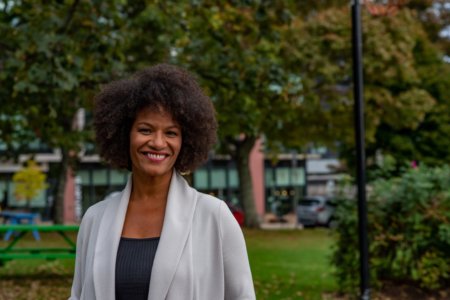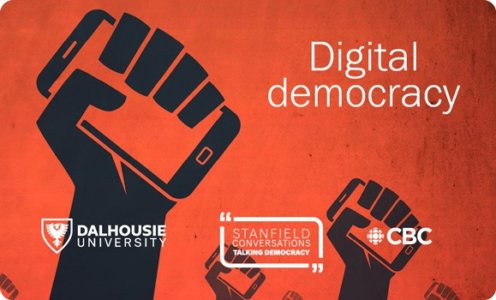CBC radio host Portia Clark extracts the best from a conversation

‘Information Morning’ host and Dal alum, Portia Clark will moderate the Stanfield Conversation Oct. 20. (photo provided by CBC)
By Anne Swan
Alum returns to Dal to moderate 2nd annual Stanfield Conversation this October.
Alum Portia Clark (BA’91) was drawn to study philosophy because she likes the challenge of debate, working out problems and is curious about relationships. Her Bachelor of Arts degree, with major in Philosophy, at Dalhousie University helped her develop the critical thinking skills she needed for her career in broadcast journalism and to host CBC Radio’s Information Morning for Mainland Nova Scotia.
“Often, I only have a few minutes to prepare for an interview – to figure out the main points, the essential information, the missing pieces, how it fits into other conversations our audience has heard, and what they might be curious about,” says Clark. “The deductive skills I learned studying philosophy at Dal are imperative to my everyday success!”
At “home” on the radio in Nova Scotia
Clark grew up in rural Nova Scotia listening to Information Morning on CBC. She started seriously considering pursuing a career in broadcast journalism after she met a foreign correspondent while she was travelling after her graduation from Dalhousie. She acquired some broadcast training, landed work at CBC Halifax, and her career accelerated from there. She moved to Edmonton where she worked in radio and television with CBC for 18 years. Clark says her first love is radio, so when she got the chance in 2018 to return to Nova Scotia to host Information Morning, she jumped at the opportunity.
“Early hours aside, it feels like home,” she says.
Motivated by her constant interactions with a huge range of people and experiences, Clark notes that there are moments in interviews when she feels so privileged to be conversing with that person, and to be a part of what they are sharing with the audience.
“I really love the experience of being live on the radio,” she says. “While there’s a lot of preparation that goes into each show that we do as a team, we then flip on the mic and bring the subject matter to life! This is the biggest reward for me.”
Visiting Dalhousie as a moderator
 Clark returns to her alma mater on Thursday, Oct. 20 to moderate the 2nd annual Rt. Hon. Robert L. Stanfield Conversation: Talking Democracy at Dalhousie University. The conversation on “Digital Democracy” will feature speakers Dr. Kathleen Hall Jamieson (University of Pennsylvania), Dr. Ron Deibert (University of Toronto) and Dr. Elizabeth Dubois (University of Ottawa), and will focus on the theme, “Technology, Media Fragmentation, and the Crisis of Democracy in America”. Guests can register to either attend in-person at the McInnes Room of the Dalhousie Student Union Building or participate virtually via a live stream which will include closed captioning as well as live American Sign Language and French translation. Audience members (both in-house and online) will also have the opportunity to submit questions for the speakers.
Clark returns to her alma mater on Thursday, Oct. 20 to moderate the 2nd annual Rt. Hon. Robert L. Stanfield Conversation: Talking Democracy at Dalhousie University. The conversation on “Digital Democracy” will feature speakers Dr. Kathleen Hall Jamieson (University of Pennsylvania), Dr. Ron Deibert (University of Toronto) and Dr. Elizabeth Dubois (University of Ottawa), and will focus on the theme, “Technology, Media Fragmentation, and the Crisis of Democracy in America”. Guests can register to either attend in-person at the McInnes Room of the Dalhousie Student Union Building or participate virtually via a live stream which will include closed captioning as well as live American Sign Language and French translation. Audience members (both in-house and online) will also have the opportunity to submit questions for the speakers.
“I am thrilled to be involved with this year’s event!” says Clark. “A moderator’s main goal is to squeeze the best out of the conversation and to recognize what the audience is thirsty for. I have a lot of questions and I hope to help everyone in the audience get engaged, too.”
Clark is looking forward to learning and gaining some clarity on the complex topic of where democracy is today. This event brings together a curated set of experts who can help the audience cut through the noise with evidence-based perspectives grounded in real data.
“This year’s Stanfield Conversation includes a knowledgeable group of panelists who have spent years tracking the changes in media and democracy. They’ll give us something to reflect on as we head toward mid-term elections in the United States and watch new dynamics play out in Canadian politics.”
Digital Democracy – a high stakes discussion
When asked whether she believes that democracy is in peril, Clark agrees with many experts that globally, democracy seems to be precarious.
“Social media is a factor, but also apathy and disengagement, and a general mistrust of politicians and political promises. I see my role as bringing my curiosity to the topic, with the vested interest of a journalist who wants to know: If we lose democracy and our faith in it, what replaces it?”
Clark recognizes that this year’s topic is a Pandora’s box-type issue and that it will be a challenge to moderate the discussion in a way that keeps focus while covering various problems, impacts and solutions. She reflects that even recently, it would have been difficult to foresee the impact technology has on the political landscape.
“The Stanfield Conversations are going to be revealing as we look at Russian influence in the 2016 election, how surveillance and hacking are being used for subversive purposes, and how media fragmentation is affecting how we elect governments. There is a debate whether having access to so many dynamic sources of news and opinion is introducing people to more perspective, or only drawing them to information that reinforces views they already hold. Our panelists have done the research, so I’m expecting an eye-opening exploration of some of these questions.”
Learn more about this year’s Conversation and how to register at www.dal.ca/fass/stanfield-conversations.